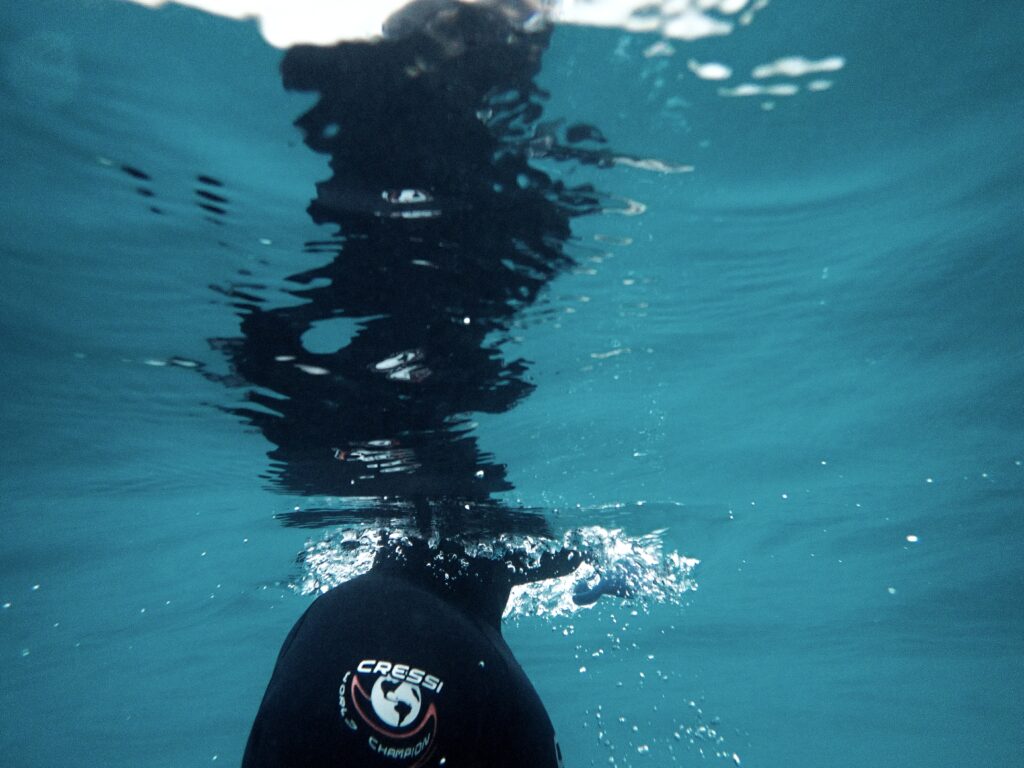Neoprene Wetsuits and Environmental Advocacy (A Splash of Hypocrisy in the Pursuit of Sustainability)
In the enchanting realm of underwater exploration, freedivers are often enthusiastic ambassadors of sustainability and environmental issues. Their passionate pleas for marine conservation resonate deeply with ocean and environmental enthusiasts.
So, while freedivers claim to be guardians of the oceans, their wetsuits may just be contributing to the very problems they seek to solve. Can freedivers truly champion sustainability while donning their beloved neoprene wetsuits? Let’s explore the environmental impact of neoprene, its environmentally friendly alternatives, and dive into the reasons why freedivers (and also their scuba counterparts) should reconsider their choice of wetsuits.

Understanding Neoprene.
Neoprene, commonly used in the production of wetsuits is a synthetic rubber made from petroleum, a non-renewable resource with a hefty carbon footprint. It provides excellent insulation by trapping a thin layer of water next to the skin, thus helping divers maintain their body temperature in cold waters. Because of its excellent insulation properties, neoprene has been the go-to material for freediving and scuba diving wetsuits for decades now. While neoprene has its functional advantages, it also comes with significant environmental drawbacks.
Environmental Consequences.
The environmental consequences associated with neoprene production and disposal cannot be ignored. The production of neoprene relies on petroleum-based materials and energy-intensive processes. This dependency on fossil fuels, the extraction, refinement, and manufacturing of neoprene contribute to greenhouse gas emissions, exacerbating climate change and its destructive effects on our oceans.
Neoprene is non-biodegradable and can persist in the environment for hundreds of years. Improper disposal of wetsuits leads to neoprene finding its way into landfills and oceans, contributing to the global plastic pollution crisis. More than 300 tons of neoprene get thrown away every year. Furthermore, incinerating neoprene releases toxic byproducts that are harmful to both human health and the environment.
The Paradox of Warmth vs. Sustainability.
It’s easy to understand why freedivers and scuba divers alike adore neoprene wetsuits. They offer unparalleled insulation, allowing us to explore the depths for prolonged periods. But as we shiver in the face of this paradox, we must acknowledge that warmth shouldn’t come at the cost of environmental harm.
Unless we want this dissonance between our actions and aspirations to undermine our credibility when discussing sustainability and environmental issues, we should look for alternatives that will allow us to stay comfortable in our dives whiles aligning with our sustainability principles.
Yulex, The Sustainable Alternative.
There’s a glimmer of hope on the horizon. The industry is slowly recognizing the environmental burden of neoprene and seeking sustainable alternatives. One promising contender is Yulex. Derived from the guayule plant, Yulex offers a renewable and biodegradable solution for wetsuit production. It boasts a significantly lower carbon footprint and reduced reliance on non-renewable resources. Yulex wetsuits significantly reduce the environmental impact associated with neoprene. By opting for Yulex, freedivers and scuba divers can align their actions with their environmental ideals, and maybe even inspire others to follow suit.
While Yulex wetsuits are slightly more expensive than neoprene wetsuits, any freediver or scuba diver who can afford a certification course or yearly diving holidays should not have much financial difficulty in buying a Yulex wetsuit.
Embrace the Moken Lifestyle.
Now, if freedivers truly want to take a leap into sustainability, there is a more cost efficient alternative. They can shed their neoprene armor altogether and embrace the Moken lifestyle. Yes, we’re talking about freediving without a wetsuit, connecting with the water in its purest form. This is not something new to freediving. The Moken tribe of Thailand and the Bajau of Indonesia have been freediving without wetsuits for centuries now.
Warm-water dives and training sessions can be performed without wetsuits, reducing the need for neoprene altogether. While this may not be feasible in colder climates, exploring the possibilities of limited wetsuit usage or transitioning to alternative materials is worth considering. Planning freediving training smartly and seasonally will remove the need of having multiple wetsuits for all the seasons.
Not only does this eliminate the environmental concerns associated with wetsuit production and disposal, but it also provides an exhilarating and intimate experience with the ocean, one that is closer to the original roots of freediving before it started turning into a consumer-oriented industry.
Clothes don't make the freediver.
Freedivers have a responsibility to align their actions with their environmental advocacy. By continuing to use neoprene wetsuits, they undermine their credibility in discussing sustainability and environmental issues.
The environmental impact of neoprene, including its manufacturing process, lack of biodegradability, and carbon footprint, cannot be ignored. Embracing alternatives like Yulex wetsuits and exploring the possibility of freediving without wetsuits offers a path toward more sustainable practices.
It is essential for freedivers to lead by example and inspire others to make conscious choices that prioritize the well-being of our oceans. While you may not be able to freedive to 100m with a Yulex wetsuit or without a wetsuit at all, your freediving will not be detrimental to the environment.
This in itself is worth more than any world record that you could break because once the ocean is full of trash, there will be no ocean left to freedive in. When that happens for the future generations, the only record people will take about is the long time memory of an ocean free of trash.
